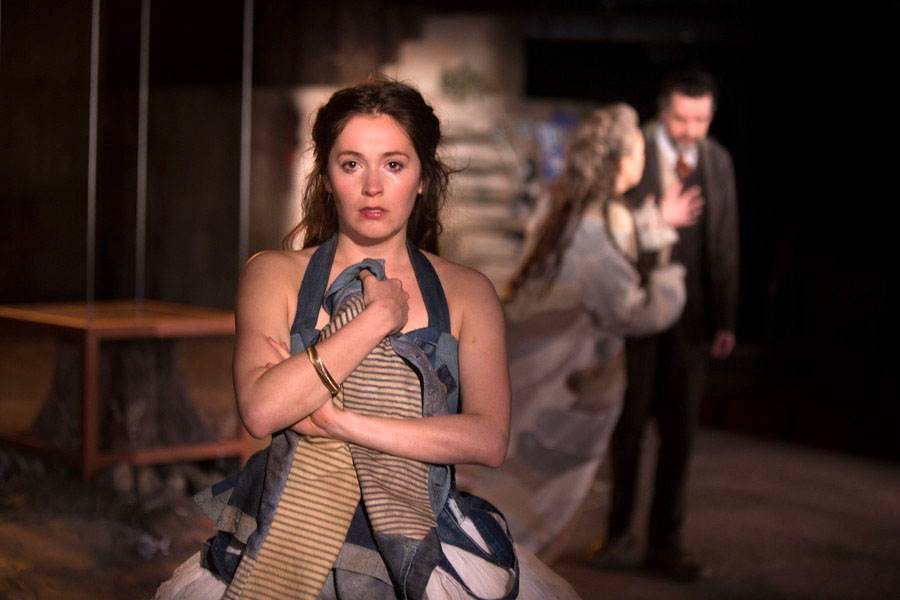
Problem play? What problem play! Dr Johnson and Bernard Shaw lambasted Cymbeline. It contains as many plots as a cemetery and director Melly Still adds more angles. Including and – may she be forgiven – one about BREXIT. And yet, and yet … it works!
Here is some of the best of Shakespeare’s late poetry, and in Innogen one of his finest female characters. And if the final act resolves more confusions and coincidences than six Dickens’ novels, it transmits an end glow of love, reconciliation and forgiveness which is truly cathartic.
All you have to do is absorb: two infant princes kidnapped, a control-freak king, a scheming step-mother, a lurid sexual wager, cross-dressing and confused identity, drugs that mimic death, a headless corpse and a war of independence.
Well actually here, without detriment, gender changes deliver a Queen Cymbeline, a scheming stepfather and one stolen princess. Whilst the action is set in the near-future, with Britain in almost pre-industrial decline, and Italy in decadent modernity. Shakespeare prevails. But first a synopsis.
When Princess Innogen secretly marries Posthumus – instead of her cloddish stepbrother Cloten, he is banished to Rome. There Iachimo wagers he can seduce Innogen and fabricates evidence. Posthumus orders her murder, but Innogen flees. dressed as a boy, and unknowingly shelters with her lost royal siblings, now wild outlaws.
Jealous and part of his step-father’s plot to gain power, Cloten decides to rape and murder Imogen, but is himself killed. She becomes an aide to a Roman general, invading because Cymbeline has refused payment of Britain’s annual tribute, and all is resolved in the resulting conflict.
The heightened attention given to political control – maybe substitute Brussels for Rome – hangs on a few, bullish pro-sovereignty lines. Swords are everywhere and modernity is nigh invisible, but for certain 3 hours 25 minutes flow with interest and intrigue.
And there is much to be praised in RSC’s current emphasis upon youth, casting loosened from gender and race labels, and bold interpretations of extreme theatricality. Here it does not conflict with the play’s meaning.
Gillian Bevan as the monarch reveals a woman’s concern over her children. Whilst as her husband, James Clyde develops a distinct line in urbane male evil.
Bethan Cullinane’s Innogen is no saint from an idolised chivalry, but a vital and abrasive modern women fighting for love. For the traditional values of Shakespearean acting, Marcus Griffiths as a strutting Cloten and Oliver Johnston as a nobly repentant Iachimo, stand out for their stage presence and verse speaking.
But this brave new world of RSC experiment, requires appreciation of other approaches. Hiran Abeysekera boyish, quietly spoken Postumas seems rather out of it at first. But he wins respect grafting a warrior determination onto to a gentle and winning humility.
Production excesses includes the mimed and meaningless rape of Cymbeline, electronic translation of foreign speech, and a ruined landscape of a set. Yet nothing detracts from the vital fact: Cymbeline deserves an honoured place in the canon.
And just for political balance on the 23 June, in Cymbeline Remain wins the day. ★★★★☆ Derek Briggs 13th May 2016
Photo by Ellie Kurttz
Following a run at the Royal Shakespeare Theatre, Cymbeline will transfer to London’s Barbican for a limited season from 31 October – 22 December 2016.

